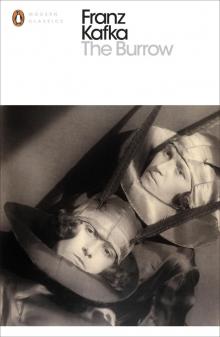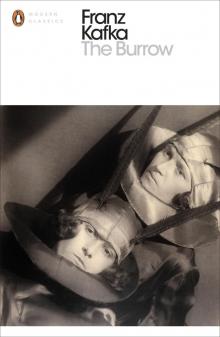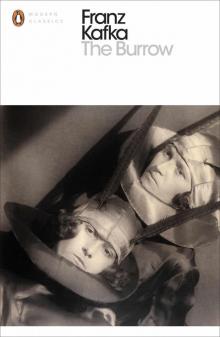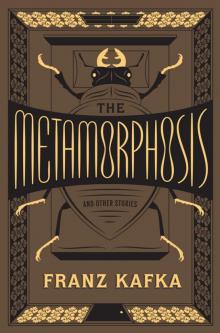- Home
- Franz Kafka
The Trial: A New Translation Based on the Restored Text Page 8
The Trial: A New Translation Based on the Restored Text Read online
Page 8
Suddenly she interrupted herself, placed her hand on K.’s as if to calm him, and whispered: “Hush, Bertold is watching us!” K. slowly lifted his gaze. In the doorway to the courtroom stood a young man; he was short, with slightly crooked legs, and attempted to lend himself an air of dignity by means of a short, scraggly reddish beard he kept fingering. K. looked at him with curiosity; he was the first student of the unknown system of jurisprudence he’d met on more or less human terms, a man who would presumably advance at some stage to higher official positions. The student, on the other hand, seemed to pay no attention at all to K., but simply gestured to the woman with one finger, which he removed for a moment from his beard, and walked over to the window; the woman bent down to K. and whispered: “Don’t be angry with me, please, please don’t, and don’t think badly of me; I have to go to him now, to this horrible man, just look at his bandy legs. But I’ll come right back, and then I’ll go with you; if you’ll take me along, I’ll go anywhere you wish, you can do with me what you like, I’ll be happy to get out of here for as long as I can, the best of course would be forever.” She stroked K.’s hand once more, sprang up, and ran to the window. Instinctively, K. grabbed for her hand in the empty air. The woman did tempt him, and no matter how hard he thought about it, he could see no good reason not to give in to that temptation. The fleeting objection that the woman was ensnaring him on the court’s behalf he easily brushed aside. How could she ensnare him? Wouldn’t he still be free enough to simply smash the entire court, at least insofar as it touched him? Couldn’t he grant himself that small degree of self-confidence? And her offer of help sounded sincere, and was perhaps not without value. And there was perhaps no better way to revenge himself upon the examining magistrate and his retinue than taking this woman away from them for himself. Then the time might come when, late one night, after long hours of exhausting labor on his false reports about K., the examining magistrate would find the bed of the woman empty. And empty because she belonged to K., because this woman at the window, this voluptuous, supple, warm body in a dark dress of heavy, coarse material, belonged to K., and K. alone.
Once he had overcome his doubts about the woman in this way, the low conversation at the window grew too long for him, and he rapped on the platform with his knuckle, then with his fist. The student glanced briefly at K. over the woman’s shoulder, but continued undisturbed; in fact he drew even closer to the woman and put his arms around her. She lowered her head as if she were listening closely to him, and he kissed her loudly on the neck as she leaned over, not even really interrupting what he was saying. Seeing in this a confirmation of the tyranny the student exercised over the woman, as she had complained, K. rose and paced up and down the room. Glancing sideways toward the student, he contemplated the quickest way to get rid of him, and so he was happy enough when the student, apparently disturbed by K.’s pacing, which had meanwhile degenerated into full-blown tromping, remarked: “If you’re impatient, why don’t you leave? You could have left even earlier, no one would have missed you. In fact you should have left the moment I arrived, and as quickly as possible.” This remark may have been an outburst of utmost anger, but it contained as well the arrogance of a future court official speaking to an unpopular defendant. K. paused quite close to him and said with a smile: “I’m impatient, that’s true, but the easiest way to alleviate my impatience is for you to leave. But if by chance you came here to study—I hear you’re a student—I’ll gladly leave you to yourself and go off with this woman. By the way, you have a lot more studying to do before you can become a judge. I don’t really know much about your judicial system yet, but I take it that crass language alone, of the sort you’re certainly shamelessly good at already, is hardly sufficient.” “They shouldn’t have allowed him to run around so freely,” said the student, as if offering the woman an explanation for K.’s insulting remarks, “it was a mistake. I told the examining magistrate so. He should at least have been confined to his room between interrogations. Sometimes I just don’t understand the examining magistrate.” “You’re wasting your breath,” said K., stretching out his hand toward the woman. “Come on.” “Aha,” said the student, “no, no, you’re not going to get her,” and with a strength one wouldn’t have expected, he lifted her in one arm and ran to the door, his back bent, gazing up at her tenderly. A certain fear of K. was unmistakable in his action, yet he dared to provoke K. even further by stroking and squeezing the woman’s arm with his free hand. K. ran along beside him a few steps, ready to grab him, and if necessary to throttle him, when the woman said: “It’s no use, the examining magistrate has sent for me, I can’t go with you, this little monster,” she said, stroking the student’s face, “this little monster won’t let me go.” “And you don’t want to be freed,” yelled K., placing his hand on the shoulder of the student, who snapped at it with his teeth. “No,” the woman cried out, and pushed K. away with both hands, “no, no, don’t do that, what do you think you’re doing! I’ll be ruined. Let go of him, oh please, let go of him. He’s just following the examining magistrate’s orders and carrying me to him.” “Then let him go, and I hope I never see you again,” said K. in enraged disappointment, and shoved the student in the back so sharply that he stumbled for a moment, only to leap higher into the air with his burden in joy at not having fallen. K. followed them slowly; he realized that this was the first clear defeat he had suffered at the hands of these people. Of course there was no reason to let that worry him, he had suffered defeat only because he had sought to do battle. If he stayed home and led his normal life he was infinitely superior to any of these people, and could kick any one of them out of his path. And he pictured how funny it would be, for example, to see this miserable student, this puffed-up child, this bandy-legged, bearded fellow, kneeling at Elsa’s bedside, clutching his hands and begging for mercy. This vision pleased K. so greatly that he decided, if the opportunity ever arose, to take the student along to Elsa one day.
Out of curiosity, K. hurried to the door, wanting to see where the woman was being taken; the student surely wouldn’t carry her through the streets in his arms. It turned out the path was much shorter. Directly across from the apartment door a narrow flight of wooden stairs led upward, probably to an attic area; they made a turn, so you couldn’t see where they ended. The student was carrying the woman up these stairs, very slowly now, and groaning, for he was weakened by his previous efforts. The woman waved down at K., and tried to show by a shrug of her shoulders that the abduction wasn’t her fault, but there wasn’t a great deal of regret in the gesture. K. looked at her without expression, like a stranger, wishing to show neither his disappointment, nor that he could easily overcome it.
The two had already disappeared, but K. was still standing in the doorway. He could only assume that the woman had not only deceived him, but lied to him as well by saying she was being carried to the examining magistrate. The examining magistrate surely wasn’t sitting around waiting for her in the attic. The wooden steps explained nothing, no matter how long one stared at them. Then K. noticed a small sign beside the stairs, walked over, and read in a childish, awkward script: “Law Court Offices Upstairs.” So the law court offices were in the attic of this apartment building? That was an arrangement scarcely calculated to inspire much respect, and for a defendant it was reassuring to imagine what limited funds this court must have at its disposal if its offices were located where tenants who were themselves among the poorest of the poor tossed their useless trash. Of course the possibility could not be ruled out that there was enough money, but that the officials grabbed it before it could be used for the court’s purposes. Based on K.’s prior experience that even seemed likely, and although such a dissolute court was humiliating for a defendant, in the end it was even more reassuring than a poverty-stricken court would have been. Now K. could see why they’d been ashamed to invite the defendant to these garrets for the initial interrogation, and chose instead to pester him in his lodgings. What a position K. w
as in, after all, compared to the judge who sat in a garret, while he himself had a large office in the bank, with a waiting room, and could look down upon the busy city square through a huge plate-glass window. Of course he received no supplementary income from bribes or embezzlement, and he couldn’t have an assistant carry a woman in his arms to his office for him. But K. would gladly waive that right, at least in this life.
K. was still standing in front of the sign when a man came up the stairs, peered through the open door into the living room, from which the hall of inquiry could be seen as well, and finally asked K. if he had seen a woman there a short while ago. “You’re the court usher, aren’t you?” K. asked. “Yes,” said the man, “oh, you’re the defendant K., now I recognize you too, welcome.” And he held out his hand to K., who hadn’t expected that at all. “But there’s no session scheduled today,” the court usher said, as K. remained silent. “I know,” K. said, and observed the court usher’s civilian jacket, which, in addition to the normal buttons, bore as sole emblem of his office two gold buttons, which seemed to have been taken off an old officer’s uniform. “I spoke with your wife a short while ago. She’s not here anymore. The student carried her off to the examining magistrate.” “You see,” said the court usher, “they’re always taking her away from me. Today is Sunday, and I have no official duties, but just to get me out of the way, they send me off with a message that’s meaningless anyway. And in fact I’m not sent far, so that the hope remains that if I really hurry, I might get back in time. I run as fast as I can to the office they’ve sent me to, shout my message so breathlessly through the half-open door that they probably don’t understand it, and race back again, but the student has moved even faster than I have, and of course he doesn’t have as far to go, he has only to run down the attic stairs. If I weren’t so dependent on them, I would have long since crushed the student against this wall. Right here next to the sign. I keep dreaming about it. He’s squashed flat a little above floor level here, his arms stretched out, his fingers spread, his crooked legs curved in a circle with blood spattered all about. But it’s just been a dream up to now.” “There’s nothing else you can do?” K. asked with a smile. “I don’t know of anything,” said the court usher. “And now it’s getting worse: up to this point he’s just carried her off for himself, but now, as I’ve been expecting for some time of course, he’s carrying her to the examining magistrate as well.” “Does your wife bear no blame at all in the matter?” asked K.; he had to control himself as he asked this question, so strong was the jealousy he too now felt. “Of course,” said the court usher, “she bears the greatest blame of all. She threw herself at him. As for him, he chases all the women. In this building alone, he’s already been thrown out of five apartments he wormed his way into. Of course my wife is the most beautiful woman in the building, and I’m the only one who doesn’t dare protect himself.” “If that’s the way it is, then obviously nothing can be done,” said K. “Why not?” asked the court usher. “Someone needs to give the student, who’s a coward, a thorough flogging the next time he tries to touch my wife, so he’ll never try it again. But I can’t do it myself, and no one will do me the favor, because they all fear his power. Only a man like you could do it.” “Why me?” asked K. in astonishment. “You are a defendant, after all,” said the court usher. “Yes,” said K., “but I should fear his influence all the more, not on the outcome of the trial perhaps, but at least on the preliminary investigation.” “Yes, of course,” said the court usher, as if K.’s opinion were equally valid. “But as a rule we don’t conduct pointless trials.” “I don’t share your opinion,” said K., “but that needn’t keep me from dealing with the student when the occasion arises.” “I would be very grateful to you,” said the court usher somewhat formally, not really seeming to believe that his greatest wish could ever be fulfilled. “There may be other officials,” K. went on, “perhaps all of them, who deserve the same treatment.” “Oh, yes,” said the court usher, as if that were self-evident. Then he gazed at K. with a look of trust he hadn’t shown before, in spite of all his friendliness, and added: “People are always rebelling.” But the conversation appeared to have taken a slightly uncomfortable turn in his opinion, for he broke it off by saying: “Now I have to report to the law court offices. Do you want to come along?” “I don’t have any business there,” said K. “You could look around the offices. No one will bother you.” “Are they worth seeing?” asked K. hesitantly, but feeling a strong urge to go along. “Well,” said the court usher, “I just thought you’d be interested.” “Fine,” said K. at last, “I’ll come along,” and he ran up the stairs more quickly than the court usher.
As he entered he almost stumbled, for there was an extra step beyond the door. “They don’t show much consideration for the public,” he said. “They show no consideration of any kind,” said the court usher, “just look at this waiting room.” It was a long hallway, with ill-fitting doors leading to the individual offices of the attic. Although there was no direct source of light, it was not completely dark, since some of the offices had been constructed with open wooden grillwork instead of solid wooden boards facing the hall, reaching to the ceiling to be sure, through which some light penetrated, and beyond which a few officials were visible writing at desks, or standing for the moment near the grille, looking out through the gaps at the people in the hallway. There were very few people in the hallway, probably because it was Sunday. They made a very modest impression. Spaced out at nearly regular intervals, they sat in two rows on long wooden benches situated on both sides of the hallway. All of them were carelessly dressed, in spite of the fact that most, to judge by their expression, their posture, the style of their beards, and numerous other small details difficult to pin down, belonged to the upper classes. Since no coathooks were available, they had placed their hats beneath the bench, probably following each other’s lead. As those sitting closest to the door caught sight of K. and the court usher, they rose in greeting; when those behind them noticed, they thought they had to do so as well, so that all of them rose as the two men passed by. They never straightened entirely; backs bowed and knees bent, they stood like beggars in the street. K. waited for the court usher, who was a few steps behind him, and said: “How humbled they must be.” “Yes,” said the court usher, “they’re defendants, everyone you see is a defendant.” “Really?” said K. “Then they’re my colleagues.” And he turned to the closest one, a tall slim man whose hair was already turning gray. “What is it you’re waiting for?” K. asked politely. The unexpected question, however, confused the man, which was even more embarrassing since he was obviously a man of the world, who would certainly have retained his self-confidence elsewhere and did not easily relinquish the superiority he had attained over so many others. But here he couldn’t even answer such a simple question and looked at the others as if it were their duty to come to his aid, and as if no one could expect an answer from him if such aid were not forthcoming. Then the court usher stepped forward and said, trying to calm the man and lend him encouragement: “The gentleman is only asking what you’re waiting for. Go ahead and answer.” The no doubt familiar voice of the court usher was more effective: “I’m waiting—” he began, and hesitated. He had apparently chosen this opening in order to answer the question exactly as it was posed, but could not think how to go on now. A few among those waiting had drawn near and gathered about them; the court usher said to them: “Get back, get back, keep the hallway clear.” They retreated somewhat, but did not return to their original places. In the meantime the man who had been questioned had pulled himself together and even managed a faint smile as he answered: “A month ago I submitted several petitions to hear evidence in my case, and I’m waiting for them to be acted upon.” “You seem to be taking great pains,” said K. “Yes,” said the man, “after all, it’s my case.” “Not everyone shares your view,” said K., “for example I’m a defendant too, but I’ll be blessed if I’ve submitted a petition to hear evidenc
e or done anything at all of that sort. Do you really think it’s necessary?” “I’m not certain,” said the man, once more completely unsure of himself; he apparently thought K. was making fun of him, and would have evidently preferred to repeat his earlier answer in full, for fear of making some new mistake, but in the face of K.’s impatient gaze he simply said: “For my part, I’ve submitted petitions to hear evidence.” “You probably don’t think I’m really a defendant,” K. said. “Oh, yes, certainly,” said the man, and stepped aside slightly, but anxiety, not belief, lay in his reply. “So you don’t believe me?” asked K., seizing the man by the arm, unconsciously provoked by his humbleness, as if he wished to compel him to believe. He had no intention of hurting him, however, and squeezed quite gently, but even so the man screamed as if K. had applied a pair of red-hot pincers, and not merely two fingers. With this ridiculous outcry K. finally had enough of the man; if he didn’t believe he was a defendant, so much the better; perhaps he even took him for a judge. And now, in parting, he indeed squeezed him harder, pushed him back down onto the bench, and walked on. “Most defendants are so sensitive,” said the court usher. Behind them almost all those who were waiting gathered around the man, who had already stopped screaming, apparently quizzing him closely about the incident. K. was now approached by a guard, who could be recognized chiefly by a saber whose scabbard, to judge by its color, was made of aluminum. K. was amazed by this and even reached out toward it. The guard, who had been drawn by the screams, asked what had happened. The court usher attempted to pacify him with a few words, but the guard said he’d have to look into it himself, saluted and hurried on, taking extremely rapid but quite short steps, probably hindered by gout.

 Diaries of Franz Kafka
Diaries of Franz Kafka Metamorphosis and Other Stories
Metamorphosis and Other Stories The Castle: A New Translation Based on the Restored Text
The Castle: A New Translation Based on the Restored Text The Complete Stories
The Complete Stories In the Penal Colony
In the Penal Colony The Trial
The Trial Amerika
Amerika The Burrow: Posthumously Published Short Fiction
The Burrow: Posthumously Published Short Fiction Sons
Sons Letters to Milena
Letters to Milena Investigations of a Dog: And Other Creatures
Investigations of a Dog: And Other Creatures Collected Stories
Collected Stories The Great Wall of China
The Great Wall of China The Burrow
The Burrow The Castle
The Castle The Meowmorphosis
The Meowmorphosis The Sons
The Sons The Lost Writings
The Lost Writings The Unhappiness of Being a Single Man
The Unhappiness of Being a Single Man Amerika: The Missing Person: A New Translation, Based on the Restored Text
Amerika: The Missing Person: A New Translation, Based on the Restored Text The Burrow: Posthumously Published Short Fiction (Penguin Modern Classics)
The Burrow: Posthumously Published Short Fiction (Penguin Modern Classics) The Diaries of Franz Kafka
The Diaries of Franz Kafka Investigations of a Dog
Investigations of a Dog The Metamorphosis and Other Stories
The Metamorphosis and Other Stories The Trial: A New Translation Based on the Restored Text
The Trial: A New Translation Based on the Restored Text